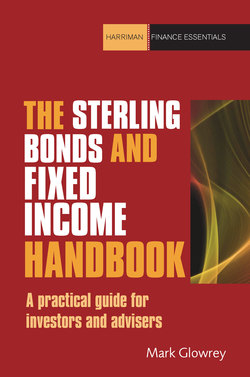Читать книгу The Sterling Bonds and Fixed Income Handbook - Mark Glowrey - Страница 24
На сайте Литреса книга снята с продажи.
A day in the life of a broker-dealer
ОглавлениеI asked Oliver Butt, a partner in the illiquid and distressed debt specialists, City & Continental, to describe a typical day at their offices on Lombard Street in the City:
“Most of my customers and also ourselves, for our own book, are interested in bonds with high returns or a good chance of substantial capital gain. These bonds require more thinking about than the run of the mill ‘safe’ corporate bonds.
Therefore I begin the day by trawling through messages I get from the market – and by this I mean the bond dealing desks of banks, investment banks and other brokers.
I receive maybe 200 such messages a day in the form of email or the Bloomberg message system (effectively an electronic message system for securities professionals), to see if there is anything interesting on offer, and I check for prices or news on bonds I am following. Another good source of ideas is to ask, when I ring up a trader to close a trade, if there is anything else he particularly thinks is a good idea or if he has something illiquid on his books he doesn’t want that is going cheap. It is always good to keep probing, not because the traders are trying to hide anything but because frequently people forget what they have on their books or erroneously assume you will not be interested, so don’t mention it.
Then, particularly if the security I am looking at is a financial sector bond, I will tend to read or at least skip through the prospectus. It is very important to work out if and under what circumstances a bond can stop paying interest without going into default. Are there any other nasty clauses that could get you? Forcible equity conversions or write downs under certain circumstances, for instance. Even though you may know the category of debt into which a given bond falls you have to look at the small print. Generally older issues are more kind to investors.
I then also consult the news to see if there is anything relevant to do with the issuer. Sometimes you are investing in the eye of the storm where you have to accept there are plenty of unknowns and a fair degree of random outcome but it may be alright on the night. Other times it is an old story or problem and in this case you have more time to consider and there will fewer guesses to make. Investing in speculative-grade bonds can be as much an art as a science and you have to try and work out what will happen if things go pear-shaped – i.e. will bond holders lose money? Is it the sort of corporate with a good business which will be recapitalised by shareholders without pain to bond holders or what degree of government support could there be? Can you trust the government to play fair (probably not if they can help it)? Or will there been some sort of arbitrary, inequitable and retrospective outcome as they choose to over-rule the prospectus you have spent so much time combing through? On the one hand if the authorities are in trouble you may well be too as they seek to play to the public gallery. But, on the other hand the bond market is collectively very powerful and the government have to make sure they don’t bring the house tumbling down on their heads if they lose all trust.
Sometimes there are opportunities when the bond has already gone over the edge and into default. As long as the expected recovery is greater than the current price you can be on to a winner. Also could there be a debt for equity swap? It can be good if you enter at the right moment. For example, British Nuclear Energy went bust, bonds traded down to 25%, there was a debt for equity swap and the price zoomed up to 200%. For this it is best to get hold of an analyst at an investment bank who has gone through the story in detail. For these types of situations the analyst, and it can involve leg work to track down the right person, is the person you want to speak to and will know much more than the trader who is really only there to trade the flows. Research having been done, occasionally you ask a trader why a bond is trading so cheaply and you get the answer “Don’t ask me mate! That is just where I got hit by someone clearing out an old position.” Then you know the odds are in your favour – he makes a turn but you have superior information.
And then it is on to the phones.”
